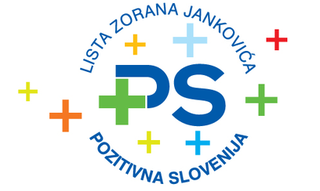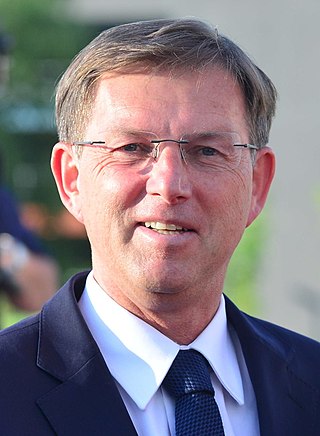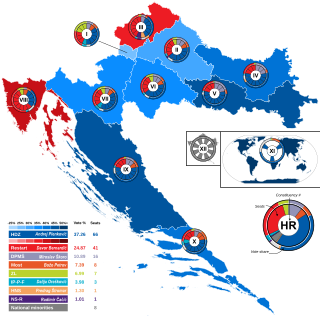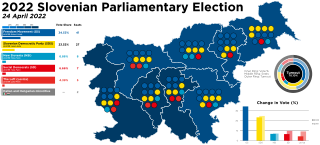The electoral threshold, or election threshold, is the minimum share of all the votes cast that a candidate or political party requires to achieve before they become entitled to representation or additional seats in a legislature. This limit can operate in various ways, e.g. in party-list proportional representation systems where an electoral threshold requires that a party must receive a specified minimum percentage of votes, either nationally or in a particular electoral district, to obtain seats in the legislature. In single transferable voting, the election threshold is called the quota and it is possible to pass it by use of first choice votes alone or by a combination of first choice votes and votes transferred from other candidates based on lower preferences. In mixed-member-proportional (MMP) systems the election threshold determines which parties are eligible for top-up seats in the legislative body.

The Slovenian People's Party is a conservative, agrarian, Christian-democratic political party in Slovenia. Formed in 1988 under the name of Slovenian Peasant Union as the first democratic political organization in Yugoslavia, it changed its name to Slovenian People's Party in 1992. On 15 April 2000 it merged with the Slovene Christian Democrats to form the SLS+SKD Slovenian People's Party, and changed its name in 2001 to Slovenian People's Party.

New Slovenia – Christian Democrats is a Christian-democratic and conservative political party in Slovenia. Since 2018, it is led by Matej Tonin. The party was formed on 4 August 2000 following a split in the unified Slovenian People's Party and Slovene Christian Democrats (SLS+SKD). NSi is a member of the European People's Party (EPP) and in the European Parliament its MEP Ljudmila Novak sits with the EPP Group.

The Social Democrats is a centre-left and pro-European social-democratic political party in Slovenia led by Matjaž Han. From 1993 until 2005, the party was known as the United List of Social Democrats. It is the successor of the League of Communists of Slovenia. As of 2022, the party is a member of a three-party coalition government with Robert Golob's Freedom Movement alongside The Left, as well as a full member of the Party of European Socialists and Progressive Alliance.

The Slovenian National Party is a nationalist political party in Slovenia led by Zmago Jelinčič Plemeniti. The party is known for its Euroscepticism and opposes Slovenia's membership in NATO. It also engages in what many consider to be historical negationism of events in Slovenia during World War II.

The Greens of Slovenia is a political party in Slovenia.

Presidential elections were held in Slovenia in October and November 2007 to elect the successor to the second President of Slovenia Janez Drnovšek. France Cukjati, the President of the National Assembly, called the elections on 20 June 2007.
Zares – Social Liberals was a social-liberal political party in Slovenia.

Gregor Virant is a Slovenian politician and public servant. Between 2004 and 2008, he served as Minister of Public Administration in Janez Janša's first government, between 2011–2013 he was Speaker of the National Assembly of Slovenia. He also served as Minister of the Interior and Public Administration in the government of Alenka Bratušek between 2013 and 2014.

Parliamentary elections were held in Slovenia on 4 December 2011 to elect the 90 deputies of the National Assembly. This was the first early election in Slovenia's history. The election was surprisingly won by the center-left Positive Slovenia party, led by Zoran Janković. However, he failed to be elected as the new Prime Minister in the National Assembly, and the new government was instead formed by a right-leaning coalition of five parties, led by Janez Janša, the president of the second-placed Slovenian Democratic Party. The voter turnout was 65.60%.

Positive Slovenia was a centre-left political party in Slovenia, following April 2014 led by founder Zoran Janković. The party was founded under the name Zoran Janković's List – Positive Slovenia. It was renamed to Positive Slovenia in its second congress, held on 21 January 2012.
Civic List is an inactive classical-liberal extra-parliamentary political party in Slovenia, led by Gregor Virant. LGV won 8.37% of the vote at the early 2011 Slovenian parliamentary election on 4 December 2011, thus gaining 8 seats in the National Assembly. After a quit of its deputy group by one of its deputies in April 2012, it has had 7 seats. Until April 2012 the party was named Gregor Virant's Civic List.

Parliamentary elections were held in Slovenia on 13 July 2014 to elect the 90 deputies of the National Assembly. The early election, less than three years after the previous one, was called following the resignation of Alenka Bratušek's government in May. Seventeen parties participated, including seven new parties, some of which formed only months before the election took place. Party of Miro Cerar (SMC), a new party led by lawyer and professor Miro Cerar, won the election with over 34% of the vote and 36 seats. Seven political parties won seats in the National Assembly. Three political parties left the Assembly, including Zoran Janković's Positive Slovenia, the winner of the 2011 election. A leftist United Left party entered the Assembly for the first time, winning six seats.

The Party of Alenka Bratušek was a political party in Slovenia. The party was formed from a split from Positive Slovenia in May 2014, and merged into the Freedom Movement in June 2022. The party participated in both the Bratušek and Šarec governments.

Miroslav Cerar Jr. is a Slovenian law professor and politician. He was Prime Minister of Slovenia, leading the 12th Government. He served as Deputy Prime Minister and Minister of Foreign Affairs in the 13th Government. He is a full professor at the Chair of Theory and Sociology of Law at the University of Ljubljana Faculty of Law.

Parliamentary elections were held in Croatia on 5 July 2020. They were the tenth parliamentary elections since the first multi-party elections in 1990 and elected the 151 members of the Croatian Parliament. 140 Members of Parliament were elected from geographical electoral districts in Croatia, three MPs were chosen by the Croatian diaspora and eight MPs came from the ranks of citizens registered as belonging to any of the 22 constitutionally recognized national minorities.

Parliamentary elections were held in Slovenia on 3 June 2018. The elections were originally expected to be held later in June 2018, but after the resignation of Prime Minister Miro Cerar on 14 March 2018 all parties called for snap elections. They were the third consecutive snap elections after 2011 and 2014.

Presidential elections were held in Slovenia on 22 October 2017. Nine candidates ran in the first round of the elections, in which the incumbent independent President Borut Pahor placed first and Marjan Šarec of the List of Marjan Šarec (LMŠ) placed second. No candidate received a majority of the vote in the first round, resulting in a run-off between Pahor and that was held on 12 November 2017. Pahor won the run-off with 53% of the vote; voter turnout in the second round was 42.13%, the lowest in any presidential election since independence.

Parliamentary elections were held in Slovenia on 24 April 2022 to elect all 90 members of the National Assembly.

Matjaž Nemec, is a Slovenian politician, who is currently a member of the European Parliament since 18 May 2022.

















